|
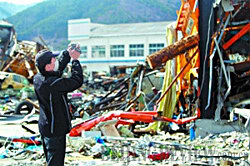 |
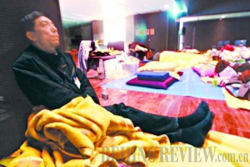 |
|
TERRIBLE DISASTER: Liu Jie takes video of an area devastated by the recent earthquake in Japan (GAN NAN) |
TEMPORARY HOME: Liu Jie stays in a crowded shelter in Japan after an earthquake rocked the country (GAN NAN) |
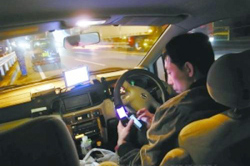 |
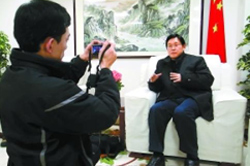 |
|
WHERE TO?: Liu Jie uses GPS and the advice of locals to find hard-hit areas for his video project after the earthquake and tsunami in Japan (GAN NAN) |
INTERVIEW AT CONSULATE: Liu Jie goes to the Chinese consulate in Japan to record an interview for his website after Japan's earthquake and tsunami (GAN NAN) |
On a recent morning, Tokyo-based photographer Liu Jie's twin sons left for school as they would on any other day. Liu went into his office to start a fresh day of work.
However, his work has taken a tragic twist as of late, as he has been spending most of his time in the office editing videos shot in quake-affected areas in Japan, where he lives. A 9.0-magnitude earthquake struck Japan's northeastern Honshu Island on March 11, triggering a tsunami that has left 10,035 people dead, with 17,443 still missing as of March 25.
"So many people are leaving Tokyo, but I won't go until the last person leaves," Liu said.
Liu is originally from southeast China's Fujian Province, but has been in the Japanese capital city for 21 years. He feels a strong bond with the city, having started a family there with his wife and two children.
Liu founded the non-profit media website Japan-Sino TV (http://www.web-tv.cn/) in the city six years ago. The site is devoted to promoting communication between Chinese and Japanese citizens. However, Liu has had to change his typical work schedule in the wake of the earthquake and tsunami.
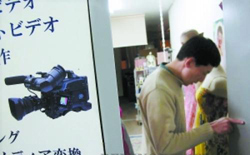 |
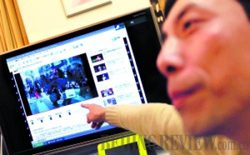 |
|
DAILY LABOR: Liu Jie often works 10 hours a day in his small studio to finish videos taken at quake-affected sites in Japan (GAN NAN) |
FIRST-HAND VIEW: Liu Jie has shot and posted many online videos of the devastation caused by Japan's recent earthquake and tsunami (GAN NAN) |
Many of Liu's Chinese friends chose to go back to China because of concerns about the nuclear power plant leaks in Fukushima. Nuclear power plants there were damaged by the earthquake and have been leaking small amounts of radioactive material.
Liu estimates that about one-third of Japan's Chinese population has returned to China, largely because their families are worried about a potential nuclear crisis. A worsening employment environment in recent years has also encouraged some of them to leave.
However, Liu prefers to stay. He believes that the potential nuclear crisis won't become too serious, and is not yet ready to uproot his family and career.
Liu takes his video camera to Fukushima, Miyagi and Iwate, the prefectures most badly damaged by the earthquake and tsunami. He records what he sees there and puts the content on his website, with the intention of showing the reality of Japan's current situation.
He thinks the situation is still in control. He mentions the latest news regarding the Fukushima nuclear plants and the radiation detection efforts being made throughout Japan.
"A one-way plane ticket to China has risen to 16,000 yuan (about $2,438) and tickets are hard to get," Liu said. "I understand why some people are eager to return. To leave or stay is up to them."
For Liu's family members in China, who keep calling him to ask about his safety, he tells them that the current situation is still okay.
"Actually, life is going on as usual," Liu noted, "except that my working schedule will need some time to readjust."
(Source: Beijing Evening News, translated by LI FANGFANG) | 